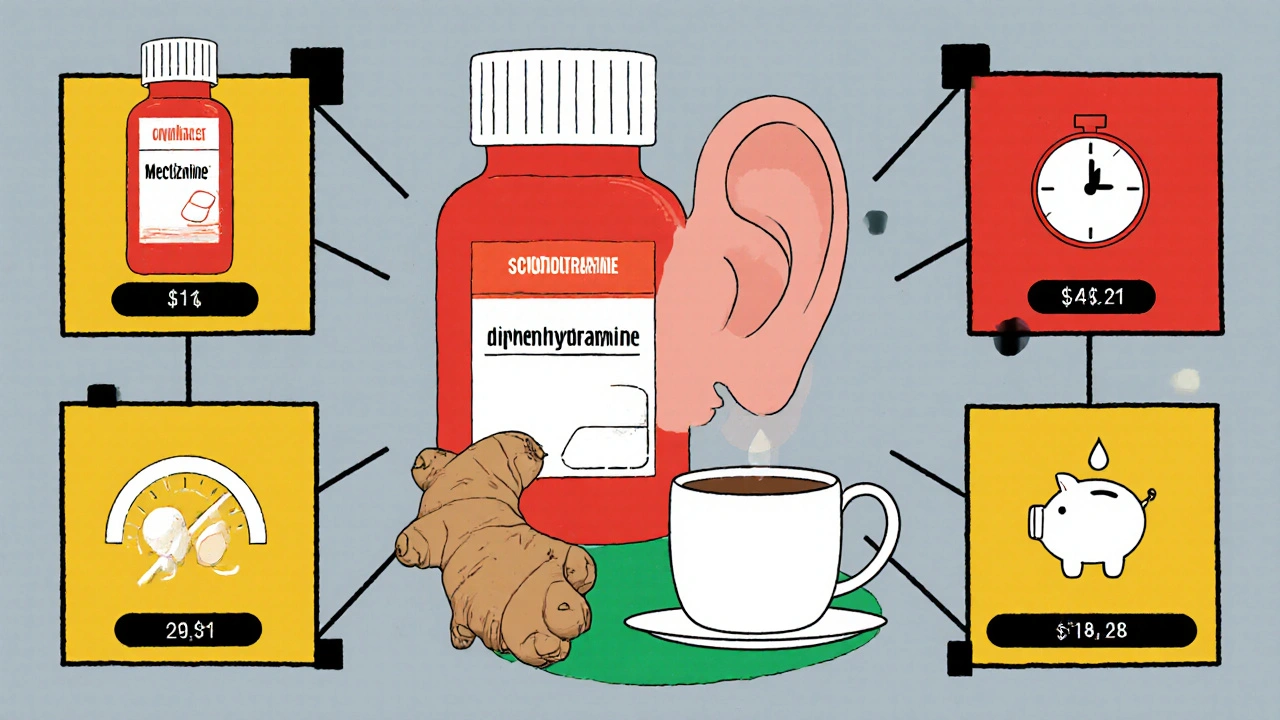Motion Sickness Medication Selector
Find Your Perfect Motion Sickness Remedy
Ever been on a cruise, a road trip, or a carnival ride and felt that dizzy, nauseous spin that makes you wish you could just stay still? You’re not alone-motion‑induced vertigo and nausea affect millions each year. While ginger tea and looking at the horizon can help, many people turn to medication for reliable relief. This guide breaks down Antivert (meclizine) and lines it up against the most common alternatives, so you can decide which pill, patch, or natural remedy fits your situation best.
What is Antivert (Meclizine)?
Antivert (Meclizine) is an oral antihistamine specifically approved to treat vertigo and motion‑sickness. First marketed in the 1970s, it is available by prescription in the U.S. and over the counter in many countries under the generic name meclizine. Its popularity stems from a relatively low sedative effect compared with older antihistamines, making it a go‑to for travelers and patients with chronic vestibular disorders.
How Does Meclizine Work?
Meclizine blocks H1 histamine receptors in the brain’s vestibular nuclei-the area that processes balance signals. By dampening the histamine response, the drug reduces the brain’s over‑reaction to mismatched motion cues, easing both the spinning sensation and the accompanying nausea. Its anticholinergic activity also contributes to the anti‑nausea effect, though at a dose that typically spares users from the heavy drowsiness seen in first‑generation antihistamines.
Common Alternatives: Quick Rundown
Below are the main contenders you’ll encounter when looking for motion‑sickness relief. Each has a unique profile that may make it better-or worse-depending on your needs.
- Dimenhydrinate (brand name Dramamine) - a classic antihistamine that’s widely available OTC. It’s effective but often leads to noticeable drowsiness.
- Cyclizine - another prescription antihistamine, similar to meclizine but with a slightly faster onset.
- Promethazine - a potent antihistamine often prescribed for severe motion sickness; it also carries strong sedative properties.
- Diphenhydramine (Benadryl) - available OTC, works well for occasional nausea but can make you feel like you’ve taken a nap.
- Scopolamine - a prescription patch placed behind the ear that releases medication over 72 hours, ideal for long trips.
- Ginger - a natural root used in teas, capsules, or candies; it’s mild, non‑sedating, and safe for most people.

Side‑by‑Side Comparison
| Medication | Prescription? | Typical Dose | Onset (minutes) | Duration (hours) | Common Side Effects | Average US Price* (per dose) |
|---|---|---|---|---|---|---|
| Antivert (Meclizine) | Prescription (OTC in Canada) | 25 mg PO | 30‑60 | 24‑48 | Drowsiness (mild), dry mouth | $0.50 |
| Dimenhydrinate (Dramamine) | OTC | 50‑100 mg PO | 30‑60 | 4‑6 | Strong drowsiness, blurred vision | $0.30 |
| Cyclizine | Prescription | 50 mg PO | 15‑30 | 12‑24 | Drowsiness, constipation | $1.20 |
| Promethazine | Prescription | 12.5‑25 mg PO | 15‑30 | 4‑6 | Heavy sedation, low blood pressure | $1.00 |
| Diphenhydramine (Benadryl) | OTC | 25‑50 mg PO | 30‑60 | 4‑6 | Intense drowsiness, dry mouth | $0.25 |
| Scopolamine Patch | Prescription | 1 mg/24 h transdermal | 60‑90 | 72 (continuous) | Dry mouth, blurred vision | $10.00 |
| Ginger (capsule 250 mg) | OTC/Natural | 250 mg PO | 30‑45 | 4‑6 | Heartburn (rare) | $0.15 |
*Prices are averages for 2025 U.S. market; actual cost varies by pharmacy and insurance.
Factors to Consider When Choosing
Every drug has a sweet spot. Below are the key decision points you should weigh before reaching for a bottle.
- Duration of travel or exposure: For a short car ride, a single dose of meclizine or dimenhydrinate works. For a week‑long cruise, the scopolamine patch or a daily meclizine regimen may be more convenient.
- Need to stay alert: If you must drive after taking medication, avoid diphenhydramine, promethazine, or high‑dose dimenhydrinate. Meclizine and cyclizine are generally the least sedating.
- Age and health status: Elderly patients are more prone to anticholinergic side effects, so lower‑dose meclizine or ginger could be safer. Pregnant travelers should discuss any antihistamine with a provider; ginger is usually considered low‑risk.
- Drug interactions: Meclizine can heighten the effects of CNS depressants (alcohol, benzodiazepines). Scopolamine should not be combined with other anticholinergics.
- Cost and insurance coverage: OTC options like dimenhydrinate and ginger are cheap but may require multiple doses. Prescription meds often have generic versions that bring the price down.
Real‑World Scenarios
Scenario 1 - International flight (12 hours): A traveler wants to stay awake for the post‑landing meeting. Meclizine 25 mg taken 1 hour before boarding provides enough nausea control without knocking them out. If the flight is longer than 24 hours, a second dose can be added after the first day.
Scenario 2 - Family road trip with kids: Parents often reach for dimenhydrinate because it’s OTC and familiar. However, the sedative effect can make kids sleepy for the rest of the day. A low‑dose ginger chewable (250 mg) combined with frequent breaks can keep them comfortable and alert.
Scenario 3 - Senior cruise passenger with vestibular migraine: The physician prescribes meclizine 25 mg nightly to manage chronic vertigo and avoids scopolamine because of the dry‑mouth risk. The patient monitors blood pressure due to the drug’s mild antihypertensive effect.

Tips to Minimize Side Effects
- Take the medication with food or a small snack to reduce stomach upset.
- Avoid alcohol and other sedatives while on antihistamines.
- If drowsiness occurs, schedule the dose for night-time or when you can rest.
- Stay hydrated; anticholinergic meds can cause dry mouth and constipation.
- For the scopolamine patch, apply to a clean, hair‑free area behind the ear and wash hands afterward.
Bottom Line: Which One Wins?
There’s no one‑size‑fits‑all answer. If you need a low‑sedation, once‑daily pill for regular travel, meclizine (Antivert) is a solid choice. For short, intense trips where you can tolerate drowsiness, dimenhydrinate is cheap and widely stocked. When you need continuous coverage without remembering to swallow a pill, the scopolamine patch shines-provided you can tolerate its dry‑mouth side effect. And when you prefer a natural route or have severe drowsiness concerns, ginger offers modest relief with almost no downside.
Frequently Asked Questions
Can I take Antivert and Dimenhydrinate together?
Generally no. Both drugs are antihistamines, so stacking them can increase sedation and anticholinergic side effects without adding extra benefit. If you need extra coverage, talk to a pharmacist about adjusting the dose rather than combining them.
Is meclizine safe for pregnant women?
Meclizine is classified as Pregnancy Category B in the U.S., meaning animal studies show no risk but there are no well‑controlled studies in pregnant women. Many OB‑GYNs consider short‑term use acceptable when nausea is severe, but it’s best to discuss any medication with your healthcare provider.
How long before travel should I take Antivert?
Take the 25 mg tablet about 1 hour before the journey. The drug reaches peak plasma levels in 30‑60 minutes, giving you the best protection during the motion period.
What’s the difference between meclizine and cyclizine?
Both are piperazine‑type antihistamines and work similarly. Cyclizine usually has a slightly faster onset (15‑30 minutes) and a comparable duration, but it’s less widely available in the U.S. and often requires a prescription.
Can ginger replace prescription meds for severe motion sickness?
Ginger can help mild to moderate symptoms and is a good adjunct, but for severe vertigo or long‑duration trips it usually isn’t strong enough on its own. Pairing ginger with a low‑dose antihistamine often yields the best balance of efficacy and tolerability.

Tracy O'Keeffe
October 18, 2025 AT 12:11So you think meclizine is the silver bullet for every queasy cruiser, eh? Allow me to burst that bubble with a dash of unapologetic reality. First off, the so‑called "low‑sedation" tag is a marketing myth that glues itself to the label like cheap glitter. In my experience, a 25 mg dose will still turn you into a sluggish sloth if you pair it with a nightly glass of wine.
And don't even get me started on the dry‑mouth fiasco – it's like chewing on cotton candy that never melts. While the table boasts a $0.50 price tag, the hidden cost is the afternoon nap you never signed up for. Contrast that with ginger, the ancient herb that has been calming seas since before anyone could spell "meclizine".
A modest 250 mg capsule can keep the seasick rolling without turning your brain into a foggy swamp. Sure, ginger's effect is subtler, but at least it doesn't hijack your ability to enjoy the ship's buffet. Now, about the scopolamine patch – it's the James Bond of motion‑sickness tools, but it's also the secret agent that will steal your saliva and make you see double.
If you value your dignity, don't slap a patch behind your ear and wander around looking like a pirate with a cursed earring. Prescription‑only meds like cyclizine may promise a faster onset, yet they share the same anticholinergic baggage. The difference between meclizine and cyclizine is about as exciting as watching paint dry on a stormy night.
And if you happen to be an elderly traveler, the anticholinergic load can tip you into confusion faster than a carnival ride spins you around. Bottom line: don't worship any pill as the ultimate savior; weigh the side‑effects, the duration, and whether you can afford a boring afternoon. Pick the remedy that lets you stay alert enough to savor the view, not just to survive the motion.
Rajesh Singh
October 27, 2025 AT 17:24If you’re looking for a moral compass in medication choices, remember that sedating yourself to avoid nausea is a betrayal of personal responsibility. The safest route is to pick a drug that lets you stay sharp enough to navigate both literal and ethical turbulence.
Albert Fernàndez Chacón
November 5, 2025 AT 23:37Meclizine does the job for most folks without knocking you out cold. Just take it with a light snack and avoid mixing with alcohol. It’s a solid option for a one‑day trip.
Drew Waggoner
November 15, 2025 AT 05:51The thing about anti‑histamines is they blur the line between relief and lethargy. I’ve tried the whole lineup and the only consistent win is timing your dose right before the motion starts.
Mike Hamilton
November 24, 2025 AT 12:04From a cultural perspective, the choice of motion‑sickness med says a lot about how we value comfort versus alertness. Many travelers abroad opt for natural ginger because it respects the body’s rhythm. In the US, the prescription route reflects a trust in pharmaceutical efficiency, for better or worse. Just remember that every drug carries its own cultural baggage.
Matthew Miller
December 3, 2025 AT 18:17Alright, fellow travelers, grab that meclizine and own the sky! No more clinging to the armrest like a scared kitten. You’ll cruise through turbulence with confidence and still have the energy to dance at the after‑party.
Liberty Moneybomb
December 13, 2025 AT 00:31Whoa, you just turned a medical guide into a Shakespearean monologue, didn’t you? While the drama is entertaining, let’s not forget the plain facts: the side‑effects exist, and they hit hard for some. If you’re paranoid about being drowsy, maybe start with a half‑dose and see how it feels. The patch sounds cool but can make you look like a secret agent who lost his voice.
Alex Lineses
December 22, 2025 AT 06:44Great point about the snack, Albert. Pairing meclizine with a small carbohydrate boost can mitigate stomach upset. Also, keep an eye on any lingering dry‑mouth; a sip of water every hour usually does the trick.
Brian Van Horne
December 31, 2025 AT 12:57Meclizine works for most trips.
Norman Adams
January 9, 2026 AT 19:11Oh, sure, because popping a pill magically turns you into a dancing astronaut. Reality check: you’ll still feel the motion, just with a side‑effect of mild drowsiness if you overdo it.
Margaret pope
January 19, 2026 AT 01:24I’ve seen dozens of patients switch from dimenhydrinate to meclizine and notice a smoother recovery. The key is to avoid alcohol and stay hydrated, especially on long cruises. Also, always check with your doctor if you have a history of blood pressure issues.